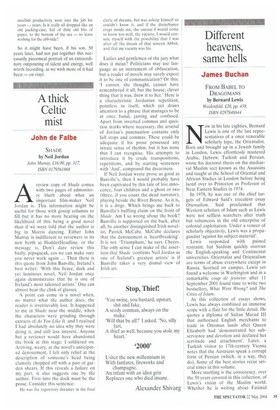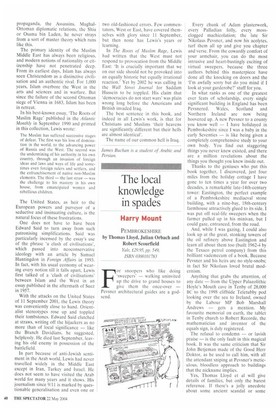Different heavens, same hells
James Buchan
FROM BABEL TO DRAGOMANS by Bernard Lewis Weidenfeld, £20, pp. 438, ISBN 0297848844 Now in his late eighties, Bernard Lewis is one of the last representatives of a once venerable scholarly type, the Orientalist. Born and brought up in a Jewish family in London, Lewis effortlessly mastered Arabic, Hebrew, Turkish and Persian, wrote his doctoral thesis on the mediaeval Muslim sect known as the Assassins and taught at the School of Oriental and African Studies in London before being lured over to Princeton as Professor of Near Eastern Studies in 1974.
In 1978, he was one of the chief targets of Edward Said's truculent essay Orientalism. Said proclaimed that Western scholars of Islam such as Lewis were not selfless searchers after truth but volunteers in the old enterprise of colonial exploitation. Under a veneer of scholarly objectivity, Lewis was a propagandist 'against his subject material'.
Lewis responded with pained restraint, but Saidism quickly overran the English-speaking and Continental universities. Orientalist and Orientalism are terms of abuse everywhere except in Russia. Scorned on campus, Lewis yet found a welcome in Washington and in a remarkable coup de jeunesse after 11 September 2001 found time to write two bestsellers, What Went Wrong? and The Crisis of Islam.
As this collection of essays shows, Lewis has always combined an immense scope with a flair for the little detail. He quotes a diploma of Sultan Murad III that authorised English merchants to trade in Ottoman lands after Queen Elizabeth had 'demonstrated her subservience and devotion and declared her servitude and attachment'. Later, a Turkish visitor to 17th-century Vienna notes that the Austrians speak a corrupt form of Persian (which, in a way, they do). Some of the best stories recur several times in this volume.
More startling is the consistency, over the 50 years covered in this collection, of Lewis's vision of the Muslim world. Whether he is writing about Fatimid propaganda, the Assassins, MughalOttoman diplomatic relations, the Shia or Osama bin Laden, he never strays from a sort of master theory which runs like this, The primary identity of the Muslim Middle East has always been religious, and modern notions of nationality or citizenship have not penetrated deep. From its earliest days, Islam has always seen Christendom as a distinctive civilisation and an authentic rival. For 1,000 years, Islam overbore the West in the arts and sciences and in warfare. But since the failure of the second Ottoman siege of Vienna in 1683, Islam has been in retreat.
In his best-known essay, 'The Roots of Muslim Rage' published in the Atlantic Monthly in September 1990 and printed in this collection, Lewis wrote:
The Muslim has suffered successive stages of defeat. The first was his loss of domination in the world, to the advancing power of Russia and the West. The second was the undermining of his authority in his own country. through an invasion of foreign ideas and laws and ways of life and sometimes even foreign rulers and settlers, and the enfranchisement of native non-Muslim elements. The third — the last straw — was the challenge to his mastery in his own house, from emancipated women and rebellious children.
The United States, as heir to the European powers and purveyor of a seductive and insinuating culture, is the natural focus of these frustrations.
One does not have to have been Edward Said to turn away from such patronising simplifications. Said was particularly incensed by the essay's use of the phrase 'a clash of civilisations', which passed into neoconservative ideology with an article by Samuel Huntingdon in Foreign Affairs in 1993. In fact, with his usual economy of wearing every notion till it falls apart. Lewis first talked of a 'clash of civilisations' between Islam and the West in an essay published in the aftermath of Suez in 1957.
With the attacks on the United States of 11 September 2001, the Lewis theory was conveniently close to hand. Orientalist stereotypes rose up and toppled their tombstones. Edward Said clutched at straws, writing off the hijackers as no more than of local significance — like the Branch Davidians, he suggested, helplessly. He died last September, leaving his old enemy in possession of the battlefield.
In part because of anti-Jewish sentiment in the Arab world, Lewis had never travelled widely in the Middle East except in Iran, Turkey and Israel. He does not seem to have visited the Arab world for many years and it shows. His journalism since 9/11 is marked by questionable generalisation and even one or
two old-fashioned errors. Few commentators, West or East, have covered themselves with glory since 11 September, but then none has Lewis's years or learning.
In The Roots of Muslim Rage, Lewis had written that the West must not respond to provocation from the Middle East: 'It is crucially important that we on our side should not be provoked into an equally historic but equally irrational reaction.' Yet by 2002 he was calling in the Wall Street Journal for Saddam Hussein to be toppled. His claim that 'democracies do not start wars' was plain wrong long before the Americans and British invaded Iraq.
The best sentence in this book, and indeed in all Lewis's work, is that for Christians and Muslims 'their heavens are significantly different but their hells are almost identical'.
The name of our common hell is Iraq.
James Buchan is a student of Arabic and Persian.



















































































 Previous page
Previous page